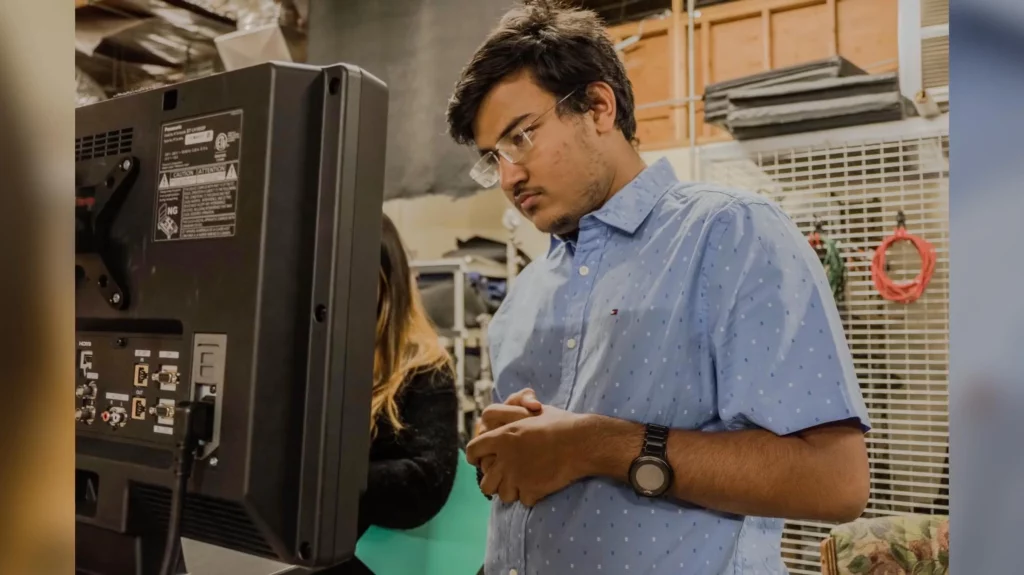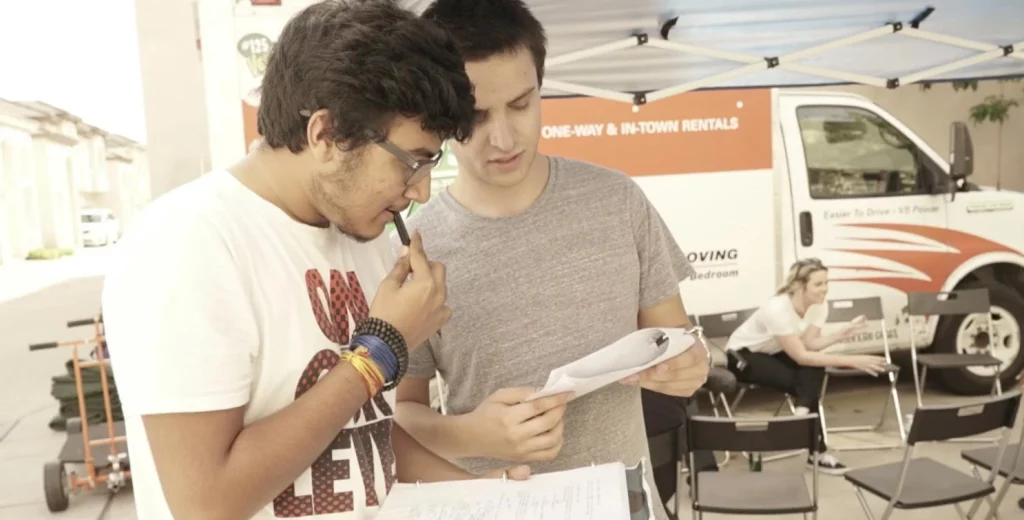(July 7, 2025) From Netflix’s Daytime Emmy-nominated Temple of Film and CNN’s Summer Shorts to T-Mobile’s Super Bowl campaigns and Victoria’s Secret’s global rebrand, U.S.-based Kartikye Gupta’s editorial touch has shaped stories seen by hundreds of millions worldwide.
An award-winning director, editor, and entrepreneur, Kartikye is blending cinematic craft with cutting-edge innovation. Beyond storytelling, he is also the founder of ScrollX.io, a breakthrough tech platform transforming post-production for filmmakers worldwide. “I didn’t grow up idolising directors. I was drawn to the invisible architecture of storytelling,” Kartikye tells Global Indian. He realised early in his career that the edit wasn’t just the final step, it was the heart of the storytelling process, and has been his creative language ever since.

Early days
Kartikye was raised in India in a family with a deep connection to the world of media and storytelling. “My grandfather co-produced a feature film in 1975 starring Dharmendra, and my father was a television producer, so I was introduced to production meetings and creative problem-solving from an early age,” he recollects. But his own artistic journey truly began when he moved to Los Angeles in 2014 after receiving a Talent Grant from the New York Film Academy’s board, which included Dan Cogan (Icarus), Clay Tarver (Silicon Valley), and Matthew Modine (Full Metal Jacket). “Later, I graduated from the American Film Institute as one of the youngest-ever MFA graduates in film editing, an institution known for shaping some of the world’s most respected visual storytellers. That foundation shaped everything I do today, blending creative intuition with technical precision,” he adds.
Film fix
Kartikye admits that he did not always want to be a filmmaker, especially in the traditional sense, and he didn’t grow up idolising directors. “I was drawn to the invisible architecture of storytelling. I was fascinated by the rhythm of scenes, the silence between cuts, and the way meaning could shift through editorial choices. The moment I edited my first short film, I realised that the edit wasn’t just the final step. It was the heart of the storytelling process. That’s when I knew I’d found my creative language,” he explains.
His first short film, Dr Elevator, was a breakthrough. It won Best Film award from Viola Davis’s production company and got screened at over 50 international festivals before being acquired by ShortsTV. Please Don’t Call the Cops, his second short, was nominated for the HBO Short Film Award at the South Asian International Film Festival. “After that, I completed my MFA at AFI, where I worked on projects for CNN, Hulu, and Netflix. I contributed to the Emmy-nominated Temple of Film, Hulu’s The Perfect Wife (the platform’s biggest true-crime debut), and edited Flint Tale, which qualified for Oscar consideration. Another pivotal milestone was creating ScrollX.io, a platform revolutionising end-credit creation for filmmakers and streamers,” he says.

Campaign cues
Kartikye Gupta has worked on Netflix’s Temple of Film, CNN’s Summer Shorts, T-Mobile’s Super Bowl campaigns, and Victoria’s Secret, and says each of these projects pushed him in different ways. “Temple of Film was about honouring cinematic legacy while designing a modern editorial flow. For CNN’s Summer Shorts, I had to strike a balance between emotional storytelling and documentary efficiency. T-Mobile’s Super Bowl campaigns demanded social virality, so I focused on high-impact pacing and cultural timing. One of our cuts earned over 70 million views and became one of the top-performing Super Bowl ads of the year. For Victoria’s Secret’s World Tour ’23, I worked on reimagining the brand’s aesthetic through a cinematic, global lens,” he explains.
His consistent goal across all platforms, whether news, ads, or culture is to create editorial work that evokes emotion, transcends format, and invites reflection.
Post production
Kartikye’s company, ScrollX.io, was born from the frustrations he experienced in post-production. Creating end credits is tedious, error-prone, and entirely manual, which makes no sense in a digital-first world, he admits. “I built ScrollX.io as an intuitive, automated platform that produces high-end, festival-ready credits in minutes. Since launching, it’s been used by over 200 films and adopted by major studios, post houses, and schools. What excites me most isn’t just the technology; it’s how much creative time it gives back to storytellers. To me, ScrollX is more than a tool. It’s the backbone of post-production, designed for the modern creative workflow,” he mentions.

Awards and more
With over 50 global film festival selections, more than 70 million Super Bowl social media engagements, and more than six million views on political campaign videos, and humanitarian film awards (Dadasaheb Phalke Festival, among others), Gupta wears a hat full of feathers. “Awards are meaningful, especially when they honour the people behind the scenes. Being recognised by JuVee Productions for Dr Elevator and contributing to Netflix’s Emmy-nominated Temple of Film validated my approach to storytelling. But I’ve never chased trophies. What drives me is the impact when a story changes how someone feels, thinks, or sees the world. If an award comes from that impact, it’s a bonus,” he says.
His goal is to bring a globally relevant yet culturally grounded perspective to every project, whether it’s a commercial or a documentary. “I have always been drawn to subtlety, rhythm, and layered meaning—traits that come from my upbringing and identity. I also make it a point to mentor South Asian talent and elevate the art of editing as a space for innovation, not just assembly. Through my work and platforms like ScrollX, I’m helping reimagine what creative leadership looks like for Indian artists working on a global stage,” he adds.
Striding past challenges
While visa barriers, cultural bias, and the reality of starting from scratch in a competitive industry were all part of the journey, he says that despite moments of uncertainty, he learnt to let the work speak louder. “I built my network film by film, cut by cut. I leaned into authenticity, stayed curious, and trusted the voice I was developing. Every obstacle shaped that voice more sharply.”

Beyond the cut
Inspired by creators who bring emotional intelligence and risk to their work, he believes in the mantra to learn to listen—to your subjects, to silence, and to subtext. “A great edit doesn’t just deliver plot. It delivers presence. What the audience feels is often more powerful than what they hear,” he avers.
Looking ahead, Kartikye Gupta wants to keep challenging himself as a documentary filmmaker—telling stories that matter, that move people, and that stay with them. “At the same time, I’m committed to exploring how technology can continue to expand what’s possible in film. I’m most excited by the intersection where emotional storytelling meets technical invention, and that’s where I plan to keep building,” he signs off.



